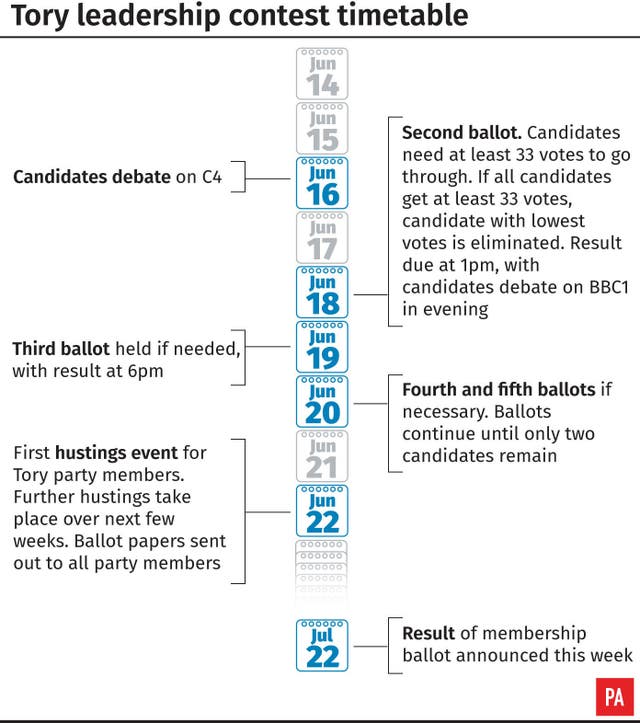‘Perfectly realistic’ to renegotiate Withdrawal Agreement, says Johnson
In his first broadcast interview of the Tory leadership contest, Boris Johnson told the BBC that he was committed to leaving the EU by October 31.

Conservative Party leadership race front-runner Boris Johnson has claimed it is “perfectly realistic” to renegotiate the Withdrawal Agreement to allow Britain to leave the European Union in October.
In his first broadcast interview of the contest, he agreed to take part in a BBC debate – but suggested he would miss one hosted by Channel 4 – amid accusations that he was hiding from the media.
And he denied using cocaine since a “single inconclusive event” more than 30 years ago.
The former foreign secretary told BBC Radio 4’s World At One programme that he was committed to leaving the EU by October 31 and said the controversial Irish backstop problems could be solved by having checks away from the border.
“There is a clear way that the now effectively defunct Withdrawal Agreement can be disaggregated – the good bits of it can be taken out.”
On the televised debates, he said it was “important that we have a sensible grown-up debate”.
“My own observation is that, in the past, when you’ve had loads of candidates, it can be slightly cacophonous, and I think the public have had quite a lot of blue-on-blue action, frankly, over the last three years.”

It came after he was criticised for a lack of media appearances, with his rival, Foreign Secretary Jeremy Hunt, accusing him of hiding from the media and preventing a wider debate in the Tory Party.
Mr Hunt told the BBC: “We can only have that debate if our front-runner in this campaign is a little bit braver in terms of getting out into the media and actually engaging in debates. Engaging in the TV debates.”
Mr Johnson said the “fundamental flaw” in the current Withdrawal Agreement is the Irish backstop, and claimed that a solution could be found.
“In the meantime, it’s absolutely crucial to prepare for no-deal and I don’t share the deep pessimism of some people about the consequences of no-deal,” he said.

“That’s not to say that I don’t think there will be some difficulties that need to be addressed and we must make sure that we can address them.”
Asked how he would solve the border problem, he said: “Those problems are easily capable of solution, as I think the (European) Commission has said, in the past with maximum facilitation techniques and, after all, at the moment you already have goods conforming to different standards.”
Mr Johnson also defended his record as foreign secretary, including his handling of the case of British-Iranian mother Nazanin Zaghari-Ratcliffe, who is imprisoned in Iran.
He said: “If you point the finger of blame at me or at anybody who has tried as I did to get Nazanin out then I think you are unintentionally exculpating the people who are really responsible and that is the Iranian Revolution(ary) Guard.”
Asked if he failed to do his homework by not reading his brief, he referred to his time as mayor of London, saying: “Look at the record of what we delivered in London.”
Earlier, Health Secretary Matt Hancock announced that he had withdrawn from the Tory leadership race as candidates seek a way to defeat front-runner Mr Johnson.
Mr Hancock, who secured 20 votes in the first ballot of the contest on Thursday, said the party is looking for a candidate for the “unique circumstances that exist now”.
He tweeted: “I have decided to withdraw from the race to be the next leader of the Conservative Party.
“I will now look for the best way to advance the values we fought for.”
Candidates need to secure 33 votes in the second ballot on Tuesday in order to continue in the contest.
Mr Johnson was the clear winner in the first ballot with 114 votes – 71 votes ahead of his nearest rival, Jeremy Hunt.





